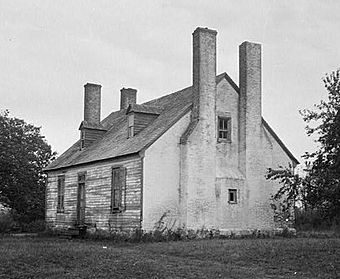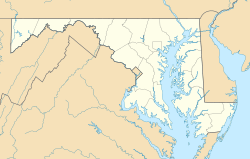West St. Mary's Manor facts for kids
|
West St. Mary's Manor
|
|

West St. Mary's Manor photographed from the northwest circa 1939, before restoration
|
|
| Nearest city | Drayden, Maryland |
|---|---|
| Built | 1780s |
| Architectural style | Central-passage house |
| NRHP reference No. | 70000854 |
Quick facts for kids Significant dates |
|
| Added to NRHP | April 15, 1970 |
| Designated NHL | April 15, 1970 |
West St. Mary's Manor is a very old and important house in St. Mary's County, Maryland. It was built in the 1780s. This house stands on the very first piece of land given by the English in what is now Maryland. Because of its history, it was named a National Historic Landmark in 1970.
Contents
Discovering West St. Mary's Manor
West St. Mary's Manor is located across the St. Mary's River. This river is near St. Mary's City, Maryland. St. Mary's City was the first capital of the Province of Maryland.
What the House Looks Like
The house is made of both brick and wood. It has 1 and a half stories. The ends of the house are made of brick. These brick ends have two chimneys each. The front and back walls of the house are made of wood. They are covered with overlapping wooden boards called clapboard.
There is a special brick section between the chimneys. It is called a "chimney pent." The front of the house faces south. It has five sections, or "bays," for windows and doors. The back of the house has three bays.
Inside the Manor House
Inside, the house has four main rooms. These rooms are built around a central hallway. This hallway goes all the way through the house. The larger rooms are on the south side. The smaller rooms are on the north side.
All the rooms on the first floor have special wooden panels on the lower part of the walls. This is called wainscoting. Each room also has a fireplace. The chimney pents act like small closets for the main rooms. The central hallway is split by an archway. A staircase to the second floor is located at the back of the hall.
The History of West St. Mary's Manor
West St. Mary's Manor was once part of a huge piece of land. This land was about 2,000 acres. It was given to Captain Henry Fleet in 1634. This was the very first land grant recorded in Maryland.
How Old is the House?
For a long time, people thought the house was built between 1700 and 1730. They thought it might have been built by Daniel Bell's family. He was one of many people who rented parts of the large property.
However, scientists used a special method called dendrochronology. This method studies tree rings. By looking at the wood used in the house, they found out it was built later. The house was actually built in the 1780s.
A Changing Style of Homes
The way West St. Mary's Manor is built shows a change in house design. Older colonial houses usually had only two rooms. This house, with its central hallway and more rooms, shows a move towards larger homes.
The house has been carefully fixed up over the years. New parts have been added that match the old style.
 | Tommie Smith |
 | Simone Manuel |
 | Shani Davis |
 | Simone Biles |
 | Alice Coachman |



